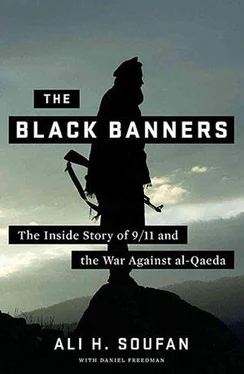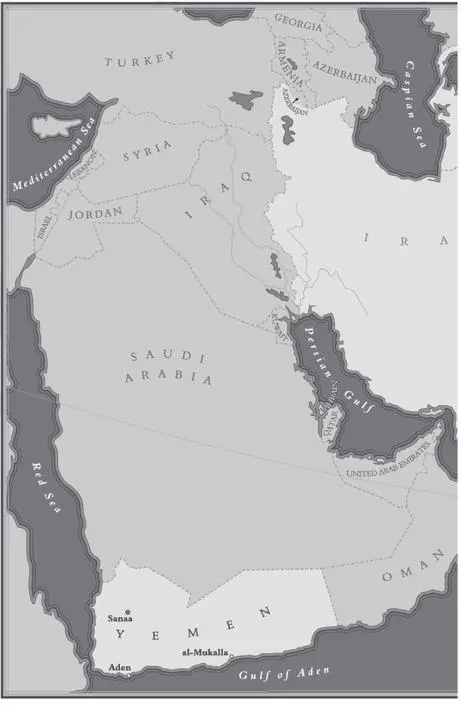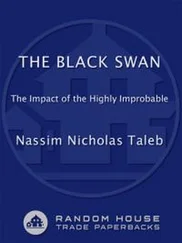ALI H. SOUFAN
with Daniel Freedman
THE BLACK BANNERS
The Inside Story of 9/11 and the War Against al-Qaeda
For Heather, Connor, Dean, and Dylan
—my peace of mind
IMPORTANT NOTE CONCERNING THE TEXT
I would like to explain to readers why there are redactions throughout this book.
As a former FBI special agent, I was required by contract to submit my manuscript for review to ensure that it did not reveal classified information. I would have submitted the manuscript for review even if I’d had no legal obligation to do so.
For three months, the FBI conducted its review, and after requesting specific changes, the bureau sent me a letter saying that the manuscript was “approved for publication with respect to FBI information.” In the same letter, the FBI informed me that the manuscript had been sent to the CIA for review. This was strange, as I have never reported to the CIA or had any contractual agreement with them. While I understood that the FBI might feel the need to consult with others in the intelligence community about certain material in the book, there was absolutely no reason to subject me to a second full-blown prepublication review. Nonetheless, I waited, and after a series of delays, I received two separate responses. On August 2, 2011, the CIA sent a list of concerns to the FBI regarding chapters 1–15, and on August 9, the agency sent concerns regarding chapter 16 to the end of the book. At this point I was told that the manuscript was “approved for publication” once the concerns were addressed.
Less than half a day after receiving each list, I sent responses to the FBI, with examples, showing that the material the CIA wanted to redact fell into four categories: it was in the public domain; it was FBI information; it was declassified CIA information; or it did not meet classification guidelines. In the fourth case, these strict guidelines protect the public from the practice of any agency’s illegally classifying information for reasons other than that of national security, such as trying to censor embarrassment or cover up mistakes.
In response, the FBI told me that the CIA “took back” their redactions and that the agency was planning to send an even more extensive set—which they did, on August 16, 2011. These redactions, like the others, violate classification guidelines and range from the ridiculous to the absurd. They include censoring part of a public exchange between a U.S. senator and myself that was broadcast live on national television.
Because I committed to publishing the book on September 12, 2011, I reluctantly offer it with all of the CIA’s redactions. The power of the tale is such that any effort to rob it of its meaning could hardly be effective, and I trust that despite the black lines blocking portions of the text, a relatively unimpeded view of The Black Banners remains.
I have requested that the FBI review the CIA’s concerns and dismiss them, and if they fail in their duty, I plan to compel disclosure of the redacted information through legal means.
—Ali H. Soufan
August 23, 2011
So it is said that if you know your enemies and know yourself, you will win a hundred times in a hundred battles.
—Sun Tzu, The Art of War
“You can’t stop the mujahideen,” Abu Jandal told me on September 17, 2001. “We will be victorious.” We sat across a rectangular table from each other in a nondescript interrogation room with unadorned white walls in a high-level national security prison in Sanaa, the capital of Yemen. The prison was operated by the country’s central intelligence agency, the Political Security Organization (PSO), the complex also serving as its headquarters. PSO officials in traditional Yemeni dress were ranged on plastic chairs along one wall, observing the conversation. Abu Jandal—the name means “father of death”—was the most senior al-Qaeda operative in custody; he had served as Osama bin Laden’s personal bodyguard and trusted confidant. We got to him through Fahd al-Quso, a Yemeni al-Qaeda operative involved in the October 12, 2000, bombing of the USS Cole. Quso had identified, in a photograph shown to him the previous evening, a man whom we knew to be Marwan al-Shehhi, who was on board United Airlines Flight 175 when it crashed into the south tower of the World Trade Center. Shehhi had once stayed at a safe house in Afghanistan operated by Abu Jandal.
I gave my partner, Naval Criminal Investigative Service (NCIS) special agent Robert McFadden, a bemused look. He raised his eyebrows and smiled at Abu Jandal. Only training and experience enabled Bob and me to smile and appear relaxed, because below the surface we were seething. “You’ll find that you have underestimated America,” I replied, speaking in Arabic, “but tell me, why do you think you’ll be victorious?”
Abu Jandal had been in prison in Yemen for eleven months in the aftermath of the Cole bombing because of his connections to al-Qaeda. Top American security officials were anxiously waiting to see what intelligence we could get from him to help us understand who had destroyed the World Trade Center and part of the Pentagon. We suspected that it was al-Qaeda, but there was as yet no definite proof, and Bob and I had been ordered to identify those responsible for the attacks “by any means necessary”—a command that neither of us had ever received before. Quso’s leading us to Abu Jandal was our first indication that al-Qaeda may have been responsible for the attack, but the connection between the two men could have been a coincidence.
Among the thousands of people listed as dead or missing in the World Trade Center were several whom Bob and I knew, including my former boss and mentor at the Federal Bureau of Investigation (FBI), John O’Neill, and a friend and colleague, FBI special agent Lenny Hatton. In Abu Jandal we had someone who took satisfaction in America’s pain. Yet a display of anger or the slightest betrayal of the sense of urgency we felt would jeopardize our efforts to get information from him. An interrogation is a mind game in which you have to use your wits and knowledge of the detainee to convince or steer him to cooperate, and essential to this is to show that you are in control. If a suspect thinks that you lack knowledge of what he’s talking about or sees that you are flustered, enraged, or pressed for time—these would be signs that he was winning and shouldn’t cooperate. We kept the fake smiles plastered on our faces and let Abu Jandal speak.
“You want to know why?” Abu Jandal asked rhetorically, with his usual gusto, as his face broke into one of his trademark broad grins. We had learned that he loved to lecture us—and that was when we could get him to slip up.
“Sure,” I said.
“I’ll tell you why,” he continued. “The hadith says,” and he began quoting: “‘If you see the black banners coming from Khurasan, join that army, even if you have to crawl over ice; no power will be able to stop them—’”
Abu Jandal paused for a second to catch his breath, but before he could finish the hadith, I continued it for him: “‘ —and they will finally reach Baitul Maqdis [Jerusalem], where they will erect their flags.’” His grin momentarily left his face, and with surprise in his voice he asked me: “You know the hadith? Do you really work for the FBI?”
Читать дальше














